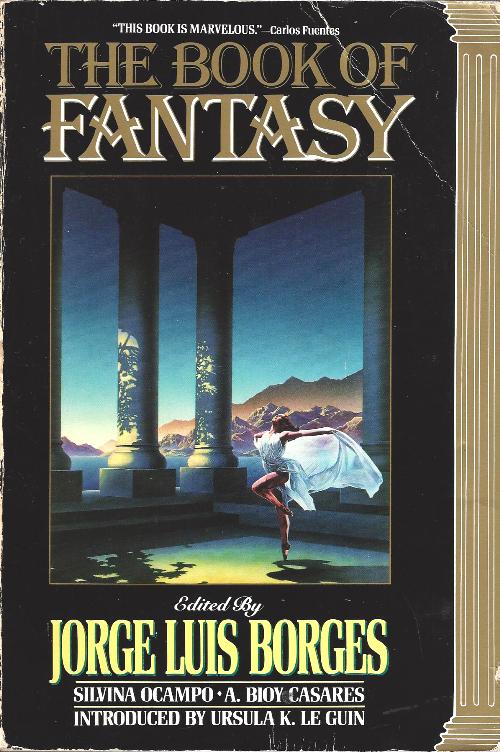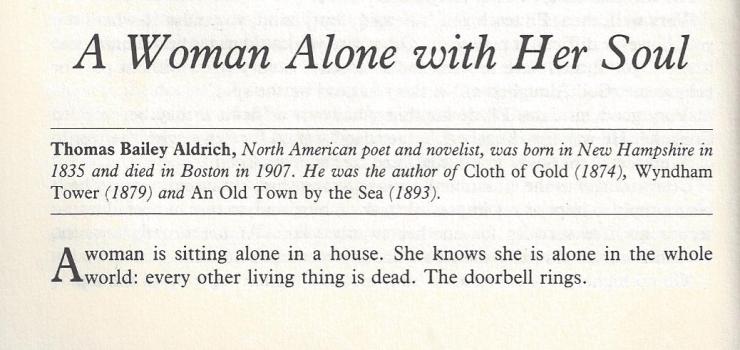Book of Fantasy
Book of Fantasy

G. K. Chesterton
English essayist, novelist and poet. Born in London in 1874; died in 1936. He published a vast amount of work, always lucid yet ardent. He wrote and revived literary styles including novels, literary criticism, lyric poetry, biography, polemic, detective stories. He is the author of essays on Robert Browning (1903) G. F. Watts (1904) and Charles Dickens (1906). His books include Heretics (1905); The Man Who Was Thursday (1908); Orthodoxy (1908); Manalive (1912); Magic (1913); The Crimes of England (1915); A Short History of England (1917); The Uses of Diversity (1920); Father Brown Stories (1927); Collected Poems (1927); The Poet and the Lunatics (1929); Four Faultless Felons (1930); Autobiography (1937); and The Paradoxes of Mr. Pond (1936).

Before the Law

The Tower of Babel
' ... the story about that hole in the ground, that goes down nobody knows
where, has always fascinated me rather. It's Mahomedan in form now; but I
shouldn't wonder if the tale is a long way older than Mahomet. It's all about
somebody they call the Sultan Aladin; not our friend of the lamp, of course,
but rather like him in having to do with genii or giants or something of
that sort. They say he commanded the giants to build him a sort of pagoda
rising higher and higher above all the stars. The Utmost for the Highest,
as the people said when they built the Tower of Babel. But the builders of
the Tower of Babel were quite modest and domestic people, like mice, compared
with old Aladin. They only wanted a tower that would reach heaven, a mere
trifle. He wanted a tower that would pass heaven, and rise above it, and
go on rising for ever and ever. And Allah cast him down to earth with a thunderbolt,
which sank into the earth, boring a hole, deeper and deeper, till it made
a well that was without a bottom as the tower was to have been without a
top. And down that inverted tower of darkness the soul of the proud Sultan
is falling for ever and ever.' G. K. Chesterton
English essayist, novelist and poet. Born in London in 1874; died in 1936. He published a vast amount of work, always lucid yet ardent. He wrote and revived literary styles including novels, literary criticism, lyric poetry, biography, polemic, detective stories. He is the author of essays on Robert Browning (1903) G. F. Watts (1904) and Charles Dickens (1906). His books include Heretics (1905); The Man Who Was Thursday (1908); Orthodoxy (1908); Manalive (1912); Magic (1913); The Crimes of England (1915); A Short History of England (1917); The Uses of Diversity (1920); Father Brown Stories (1927); Collected Poems (1927); The Poet and the Lunatics (1929); Four Faultless Felons (1930); Autobiography (1937); and The Paradoxes of Mr. Pond (1936).
The
Shadow of the Players
In one of the tales which
make up the series of the Mabinogion,
two enemy kings play chess while in a nearby valley their respective
armies battle and destroy each other. Messengers arrive with reports of
the battle; the kings do not seem to hear them and, bent over the
silver chessboard, they move the gold pieces. Gradually it becomes
apparent that the vicissitudes of the battle follow the vicissitudes of
the game. Toward dusk, one of the kings overturns the board because he
has been checkmated, and presently a blood-spattered horseman comes to
tell him: 'Your army is in flight. You have lost the kingdom.'
- EDWIN MORGAN
- EDWIN MORGAN
Bóng Kỳ
Thủ
Một trong những truyện của
chuỗi truyện Mabinogion, hai ông vua kẻ thù ngồi chơi cờ,
trong lúc trong thung lũng kế đó, hai đạo binh của họ quần
thảo, làm thịt lẫn nhau. Giao liên, thiên sứ… liên
tiếp mang tin về, họ đếch thèm nghe, chúi mũi vô mấy con cờ bằng
vàng. Rõ ràng là tuồng ảo hoá bày ra ở thung lũng nhập thành
một với tuồng cờ tướng. Sau cùng, vào lúc chập tối, 1 ông
vua xô đổ bàn cờ, khi bị chiếu bí, đúng lúc đó, tên kỵ sĩ từ
chiến trường lao về, thưa hoàng thượng, VC lấy mẹ mất Xề Gòn
rồi!
Hà, hà!
Vô tiệm sách cũ, vớ được
cuốn lạ, Borges biên tập. GCC chưa từng nghe tới cuốn này! Kafka đóng
góp hai truyện, Josephine và Trước Pháp Luật. Trang Tử, Bướm mơ người
hay người mơ bướm. Một truyện trong cuốn sách.

The
Shadow of the Players
In one of the tales which
make up the series of the Mabinogion,
two enemy kings play chess while in a nearby valley their respective
armies battle and destroy each other. Messengers arrive with reports of
the battle; the kings do not seem to hear them and, bent over the
silver chessboard, they move the gold pieces. Gradually it becomes
apparent that the vicissitudes of the battle follow the vicissitudes of
the game. Toward dusk, one of the kings overturns the board because he
has been checkmated, and presently a blood-spattered horseman comes to
tell him: 'Your army is in flight. You have lost the kingdom.'
- EDWIN MORGAN
- EDWIN MORGAN
Bóng Kỳ
Thủ
Một trong những truyện của
chuỗi truyện Mabinogion, hai ông vua kẻ thù ngồi chơi cờ,
trong lúc trong thung lũng kế đó, hai đạo binh của họ quần
thảo, làm thịt lẫn nhau. Giao liên, thiên sứ… liên
tiếp mang tin về, họ đếch thèm nghe, chúi mũi vô mấy con cờ bằng
vàng. Rõ ràng là tuồng ảo hoá bày ra ở thung lũng nhập thành
một với tuồng cờ tướng. Sau cùng, vào lúc chập tối, 1 ông
vua xô đổ bàn cờ, khi bị chiếu bí, đúng lúc đó, tên kỵ sĩ từ
chiến trường lao về, thưa hoàng thượng, VC lấy mẹ mất Xề Gòn
rồi!
Hà, hà!
Before the Law
Before the
Law stands a doorkeeper. To this doorkeeper there comes a man from the
country
and prays for admittance to the Law. But the doorkeeper says that he
cannot
grant admittance at the moment. The man thinks it over and then asks if
he will
be allowed in later. 'It is possible,' says the doorkeeper, 'but not at
the
moment.' Since the gate stands open, as usual, and the doorkeeper steps
to one
side, the man stoops to peer through the gateway into the interior.
Observing
that, the doorkeeper laughs and says: 'If you are so drawn to it, just
try to
go in despite my veto. But take note: I am powerful. And I am only the
least of
the doorkeepers. From hall to hall there is one doorkeeper after
another, each
more powerful than the last. The third doorkeeper is already so
terrible that
even I cannot bear to look at him.' These are difficulties the man from
the country
has not expected; the Law, he thinks, should surely be accessible at
all times
and to everyone, but as he now takes a closer look at the doorkeeper in
his fur
coat, with his big sharp nose and long, thin, black Tartar beard, he
decides that
it is better to wait until he gets permission to enter. The doorkeeper
gives him
a stool and lets him sit down at one side of the door. There he sits
for days and
years. He makes many attempts to be admitted, and wearies the
doorkeeper by his
importunity. The doorkeeper frequently has little interviews with him,
asking
him questions about his home and many other things, but the questions
are put
indifferently, as great lords put them, and always finish with the
statement
that he cannot be let in yet. The man, who has furnished himself with
many
things for his journey, sacrifices all he has, however valuable, to
bribe the doorkeeper.
The doorkeeper accepts everything, but always with the remark: 'I am
only
taking it to keep you from thinking you have omitted anything.' During
these
many years the man fixes his attention almost continuously on the
doorkeeper.
He forgets the other doorkeepers, and this first one seems to him the
sole
obstacle preventing access to the Law. He curses his bad luck, in his
early
years boldly and loudly; later, as he grows old, he only grumbles to
himself.
He becomes childish, and since in his yearlong contemplation of the
doorkeeper
he has come to know even the fleas on his fur collar, he begs the fleas
as well
to help him and to change the doorkeeper's mind. At length his eyesight
begins
to fail, and he does not know whether the world is really darker or
whether his
eyes are only deceiving him. Yet in his darkness he is now aware of a
radiance
that streams inextinguishably from the gateway of the Law. Now he has
not very
long to live. Before he dies, all his experiences in these long years
gather
themselves in his head to one point, a question he has not yet asked
the doorkeeper.
He waves him nearer, since he can no longer raise his stiffening body.
The
doorkeeper has to bend low towards him, much to the man's disadvantage.
'What
do you want to know now?' asks the doorkeeper; 'you are insatiable.'
'Everyone
strives to reach the Law,' says the man, 'so how does it happen that
for all
these many years no one but myself has ever begged for admittance?' The
doorkeeper recognizes that the man has reached his end, and, to let his
failing
senses catch the words, roars in his ear: 'No one else could ever be
admitted
here, since this gate was made only for you. I am now going to shut
it.'
Frank Kafka
The Book of
Fantasy
Edited by
Jorge Luis Borges, Silvina Ocampo, A. Bloy Casares
A collection of classic
fantasy stories which resulted from a chance conversation between three
friends in Buenos Aires in 1937. The friends were Jorge Luis Borges,
Adolfo Bioy Casares and his wife Silvina Ocampo and they decided to
gather together their favourite stories.
Comments
Post a Comment